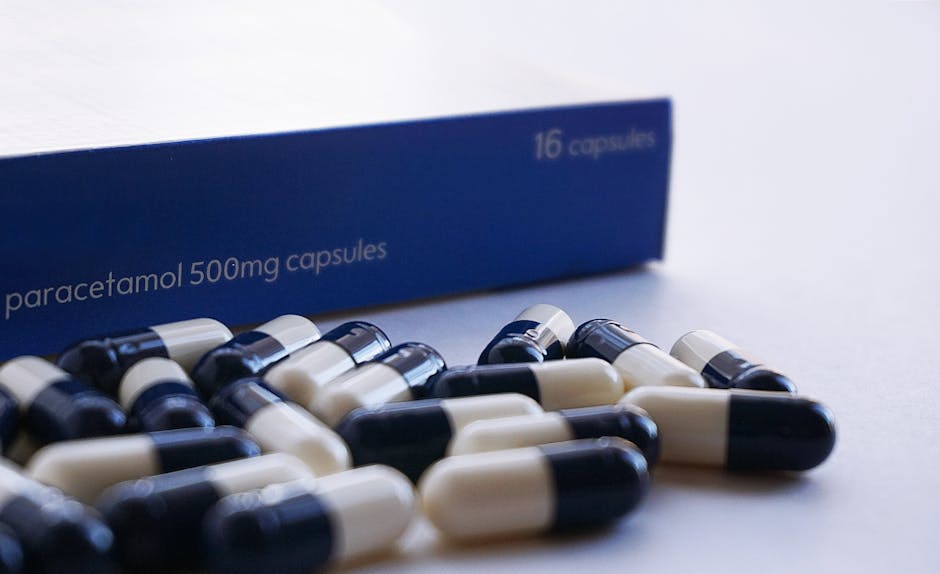The Role of Probiotics in Reducing Pain
In our quest for better health and well-being, we often overlook the intricate connection between our gut and overall physical wellness. The emerging field of probiotics has been gaining traction for its potential to alleviate various health issues, including pain management. The idea that bacteria can help reduce pain might sound unconventional, but recent research suggests that the gut-brain axis plays a significant role in pain perception. In this article, we will delve into the fascinating world of probiotics and explore their role in reducing pain.
The Gut-Brain Connection

Before we dive into the specifics of how probiotics can help with pain relief, it is essential to understand the gut-brain connection. The gut, often referred to as the “second brain,” houses trillions of bacteria that play a crucial role in digestion, immune function, and even mental health. Recent studies have shown that the gut microbiota can communicate with the central nervous system through various pathways, influencing our mood, behavior, and perception of pain.
When the balance of gut bacteria is disrupted, it can lead to inflammation and increased pain sensitivity. Probiotics, which are live bacteria that provide health benefits when consumed, can help restore the microbial balance in the gut and potentially reduce pain signals to the brain. By modulating the gut microbiota, probiotics have the potential to alleviate chronic pain conditions such as fibromyalgia, migraines, and even inflammatory bowel disease.
Probiotics and Inflammation

Inflammation is a common underlying factor in many chronic pain conditions. Probiotics have been shown to have anti-inflammatory properties, which can help reduce pain and discomfort. Certain strains of probiotics, such as Lactobacillus and Bifidobacterium, produce short-chain fatty acids that have anti-inflammatory effects in the body.
Studies have demonstrated that probiotic supplementation can reduce markers of inflammation in individuals with conditions like arthritis, irritable bowel syndrome, and chronic fatigue syndrome. By reducing inflammation in the gut, probiotics may indirectly alleviate pain in other parts of the body. This anti-inflammatory effect of probiotics is a promising avenue for managing chronic pain in a natural and holistic way.
Probiotics and Neuropathic Pain

Neuropathic pain, which results from damage or dysfunction of the nervous system, can be challenging to treat with conventional pain medications. Probiotics offer a novel approach to managing neuropathic pain by targeting the underlying mechanisms that contribute to nerve sensitization and pain perception.
Research has shown that certain probiotic strains can modulate the gut-brain axis and influence neurotransmitter pathways involved in pain signaling. For example, some probiotics have been found to increase the production of gamma-aminobutyric acid (GABA), a neurotransmitter that inhibits pain transmission in the central nervous system. By enhancing GABA production, probiotics may help reduce neuropathic pain and improve quality of life for individuals suffering from chronic nerve-related conditions.
Probiotics and Mental Health

The gut-brain axis is a bidirectional communication system that not only influences physical health but also plays a significant role in mental well-being. Probiotics have been studied for their potential effects on mood, anxiety, and stress, all of which can impact pain perception and tolerance. By promoting a healthy balance of gut bacteria, probiotics may help reduce psychological distress and improve pain management outcomes.
Researchers have found that probiotic supplementation can alter the production of neurotransmitters like serotonin, which is known to regulate mood and emotional responses. Imbalances in serotonin levels have been linked to conditions such as depression and anxiety, which can exacerbate chronic pain symptoms. By modulating serotonin production, probiotics may have a beneficial effect on both mental health and pain perception.
Probiotics and Pain Medication
One of the major challenges in pain management is the overreliance on prescription medications, which can have side effects and long-term consequences. Probiotics offer a natural and potentially safer alternative to conventional pain medication, with fewer adverse effects on the body.
Studies have shown that probiotics can enhance the efficacy of pain medications by improving their absorption and bioavailability in the body. By optimizing drug metabolism and reducing gastrointestinal side effects, probiotics may allow for lower doses of pain medication to be used, thereby minimizing the risk of dependency and tolerance. Integrating probiotics into pain management protocols could lead to more effective and sustainable outcomes for individuals suffering from chronic pain conditions.
Common Misconceptions
Despite the growing body of research supporting the benefits of probiotics in pain management, there are still some misconceptions surrounding their efficacy and safety. One common myth is that all probiotic supplements are created equal, which is not the case. Different strains of probiotics have varying effects on the body, so it is essential to choose the right combination of strains for specific health concerns.
Another misconception is that probiotics are only beneficial for gut health and digestion, overlooking their potential impact on systemic conditions like pain. While probiotics do play a significant role in gut health, their reach extends far beyond the digestive system, influencing various aspects of physical and mental well-being.
FAQs
Q: Can probiotics help with acute pain conditions?
A: While probiotics may not provide immediate relief for acute pain, they can be beneficial in managing chronic pain conditions over time by addressing underlying inflammation and gut dysbiosis.
Q: Are there any side effects of taking probiotics for pain relief?
A: In general, probiotics are considered safe for most individuals, but some people may experience mild gastrointestinal symptoms like bloating or gas when first starting probiotic supplementation. It is essential to consult a healthcare provider before incorporating probiotics into your pain management regimen.
Conclusion
As we continue to unravel the intricate relationship between the gut microbiota and pain perception, probiotics emerge as a promising ally in the fight against chronic pain. By modulating inflammation, neurotransmitter pathways, and mental health, probiotics offer a holistic approach to pain management that addresses the root causes of discomfort and dysfunction.
Whether you are dealing with fibromyalgia, migraines, neuropathic pain, or other chronic conditions, incorporating probiotics into your daily routine may provide relief and improve your overall quality of life. By harnessing the power of beneficial bacteria, we can take proactive steps towards a healthier and pain-free future.
To wrap things up, the role of probiotics in reducing pain goes beyond conventional treatment modalities, offering a natural and sustainable approach to managing chronic pain conditions. By nurturing our gut microbiota and fostering a healthy balance of beneficial bacteria, we can unlock the potential for long-lasting pain relief and optimal well-being.




